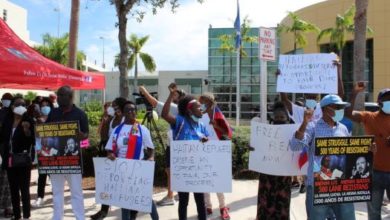Massachusetts’ Congressional Leaders Urge DHS Secretary Napolitano to Save Lives and Help Haiti by Reunifying Haitian Families
BOSTON – On Tuesday, October 25 U.S. Department of Homeland Security Secretary Janet Napolitano was again urged to promptly parole into the United States Haitian beneficiaries of approved family-based visa petitions, to “mirror” the Cuban Family Reunification Parole Program which promptly paroles such beneficiaries and help Haiti recover from last year’s devastating earthquake by generating significant remittances.
United States Senators John Kerry and Scott Brown and United States Representatives Michael Capuano, Barney Frank, James McGovern, Edward Markey, John Olver, and Stephen Lynch, all of Massachusetts, urge Secretary Napolitano:
“We write with what we believe to be a simple and compelling request: that you use your authority to parole into the United States the beneficiaries, now in Haiti, of approved family based immigration petitions, without regard to the priority date of the applications. Members of Congress made this request in the immediate aftermath of the January 2010 earthquake. Conditions in Haiti remain deplorable, and, in many cases, life threatening. Family members in the United States continue to express to us their anxiety and anguish about children and spouses living there.”
They state that “we believe this exercise of parole authority, which would mirror that of the Cuban Family Reunification Parole Program established in 2007, to be just and appropriate” and “are chiefly concerned to reunite families of legal permanent residents separated from spouses and minor children. We respectfully request immediate exercise of parole authority on their behalf.”
They also affirm that there “would be substantial benefits in admitting adult children of citizens and LPR’s. Haitian adults, gainfully employed in the United States, would, we are convinced, aid in the reconstruction of Haiti through remittances which they would send to their extended families there.”
Yesterday’s letter references a March 8, 2010 letter to Secretary Napolitano urging this same relief from eight leading House members of both parties, including Republican U.S. Representative Ileana Ros-Lehtinen, Chairman of the U.S. House Committee on Foreign Affairs. Her counterpart, Senator Kerry, who has now written two letters urging this relief, is Chairman of the U.S. Senate Committee on Foreign Relations.
Massachusetts Governor Deval Patrick has also urged Secretary Napolitano to do this. In his September 22, 2011 letter, the Governor wrote, “An exercise of parole authority would allow Haitians with an already approved, legal method of entering the United States to be reunited with close family members in the United States while awaiting visa availability. Expediting family reunification through safe and orderly channels would bring families together safely without the risk of a dangerous maritime migration, and would allow for greater remittances to be sent to aid Haiti’s recovery.”
These letters championing Haitian family reunification join calls for this relief from the editorial boards of the Boston Globe, Chicago Tribune, Los Angeles Times, Philadelphia Inquirer, Washington Post, San Antonio Express News, Miami Herald, Newsday, Star-Ledger, and Palm Beach Post, in thirteen separate editorials; from Philadelphia’s City Council and the U.S. Conference of Mayors in strong resolutions; from six U.S. Senators in a separate 2011 letter; from Haitian-American leaders and editorial writers; and in a June 2011 Center for Global Development working paper urging DHS to create a Haitian Family Reunification Parole Program and to start by promptly paroling vulnerable children and spouses.
As of November 1, 2010, the United States had approved family-based immigrant visa petitions for 105,000 beneficiaries who nevertheless remain on a wait list of four to eleven years in Haiti, where many may not survive. In contrast, over 30,000 approved Cuban beneficiaries have been paroled into the United States since 2009 alone under the Cuban FRPP, which the Massachusetts leaders urge DHS Secretary Napolitano to “mirror.”
In urging this action as a low-cost way to help Haiti recover, the authors of “Migration as a Tool for Disaster Recovery: A Case Study on U.S. Policy Options for Post-Earthquake Haiti,” Center for Global Development, June 2011, note:
Rather than waiting 4 to 11 years for a visa in Haiti, beneficiaries could be paroled into the United States where they can be reunited with family and have employment authorization.
The proposal has merit not only for the humanitarian purpose it would serve but also to enable Haitians to send more remittances home and foster economic development with greater speed.
Instituting a family reunification parole program for Haitians is simpler than it may appear, since it requires no congressional action.
The Cuban program’s rationale of saving lives at sea and providing for orderly migration applies with equal force to Haiti.
No one would get a “green card” any sooner — like the Cubans, they’d just be able to wait for them here w/their families rather than in Haiti.
Since Haiti’s January 12, 2010 earthquake, IJDH has led national efforts to persuade the White House to create a Haitian FRPP. Grassroots efforts are underway in areas including Florida, New York, and Massachusetts, where a dedicated team of volunteers helped secure yesterday’s letter, which the Haitian American community and its supporters strongly welcome and applaud.



